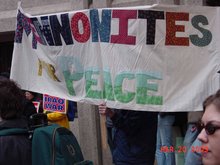These two questions are the passion of John Fife, long-time Presbyterian pastor in Tucson, Arizona. He gave us good advice at Grandview Presbyterian Church (KCK) on March 10: Just tell the U.S. government, "We are a sanctuary church." Go public. Then the government is less likely to harrass.
In the 1980s, John Fife's congregation sheltered about 13,000 people, ending in 1992 when Guatemalan Peace Accords were signed.
Now the churches are coming together again. One organization is "No More Deaths," which has included Christian Peacemaker Teams personnel, maintaining water stations and taking backpacks of food. To date more than 5,000 migrants have died in the desert, trying to get to employment in the U.S. Meanwhile, stateside, immigration officials and vigilantes like Minute Men are raiding work places, and day labor centers to round up "illegals." Parents have been apprehended as they take their kids to school.
"Churches," proclaims John Fife, "can be a safe place to keep families together when threatened with deportation. We're talking Family Values." (Many families represent mixed immigration status; children born in this country are citizens.) When people ask, isn't this illegal? the answer is, "If the church is public about this, it is not illegal."
Churches can also host day-labor centers on their property. Immigration officials are trained not to go onto church property (or school, hospitals, or mortuaries). Churches can train pastors and others to confront people like Minute Men (who are organizing locally).
Until the U.S. governments provides a pathway to citizenship for people coming across the southern border, churches are important in this New Sanctuary Movement.
— Muriel T. Stackley


No comments:
Post a Comment